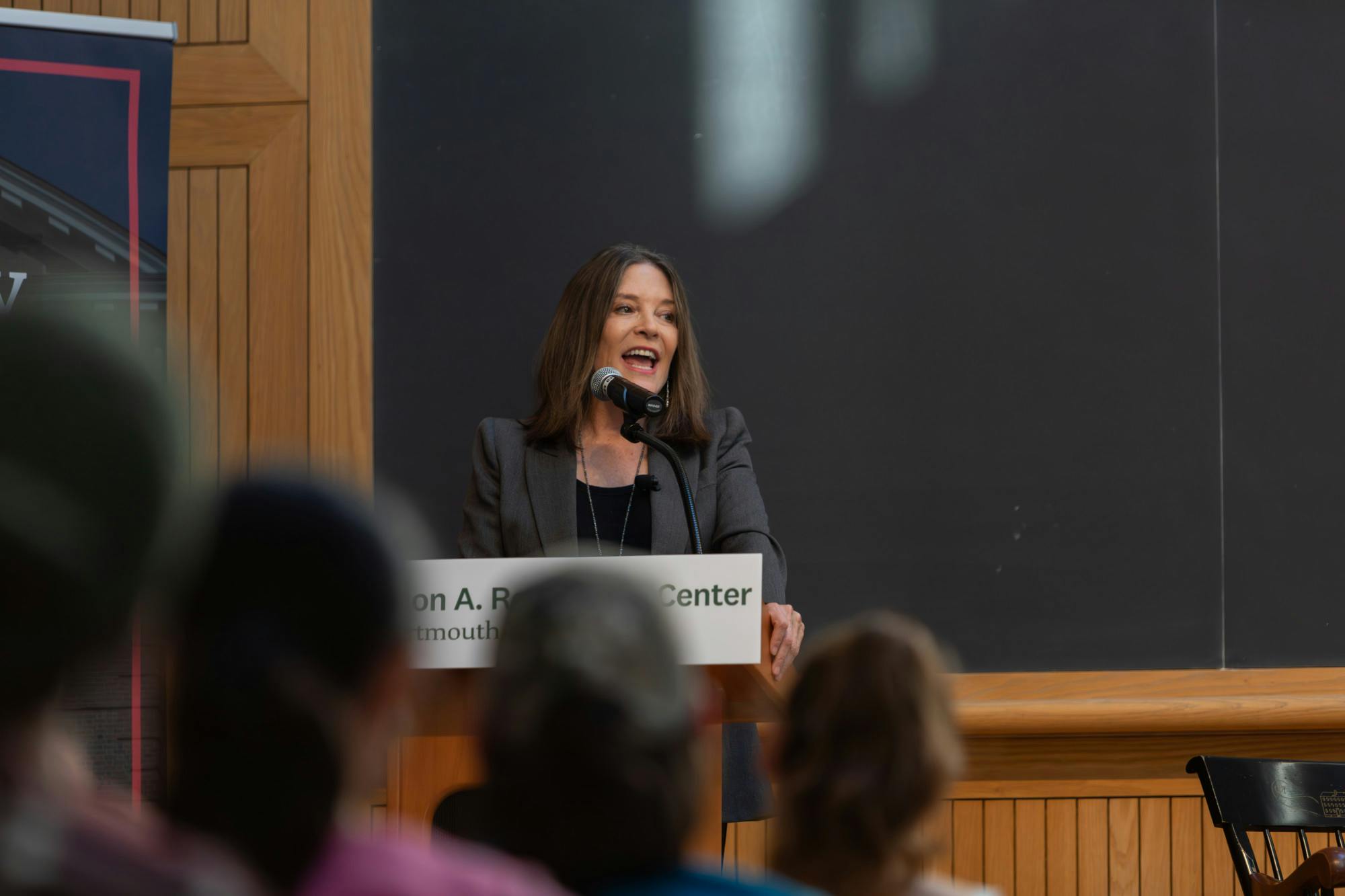On Oct. 3, the Rockefeller Center for Public Policy and the Dartmouth Political Union co-hosted a conversation with Democratic presidential candidate Marianne Williamson as part of the “Path to the Presidency” discussion series. Public programs officer Joanne Blais estimated that over 100 people watched the event in-person and on Zoom.
Williamson, a self-help author, spiritual leader and activist, launched her longshot campaign for the Democratic nomination for president on March 4, 2023 and was the first candidate to challenge President Joe Biden for the party’s 2024 nomination. Willliamson also campaigned for president in 2020, before dropping out that January due to low polling numbers.
Williamson began her remarks by calling for a return to “when our national vision was first formed … at the signing of the Declaration of Independence,” claiming these values have been dismissed for generations.
“I’m running for president because it’s our turn now,” she said. “I’m running for president because we’re living out the same struggle [of previous generations].”
Later in her remarks, Williamson denounced the Democratic Party, claiming that it is “now guided by the corporatist element of [the] party … who is represented, among others, by Joe Biden.” Williamson labeled the Democratic Party’s business ties a form of “economic tyranny,” adding that “our governing principle is no longer democracy … [it’s] short-term profit maximization for huge, multinational, corporate forces.”
DPU executive board member Ella Klinsky ’26 moderated the event, fielding questions from the audience after Williamson’s opening statements. Williamson addressed several of her policy proposals, including her Economic Bill of Rights, which would mandate a living wage for all jobs, tuition-free higher education and universal healthcare, among other things.
When asked about the implementation and financing of a system of tuition-free college, Williamson referenced the Australian government’s system of requiring only those whose salaries exceeded a certain threshold to slowly pay back the cost of their tuition.
“The American Dream used to be that you would own a house,” she said. “The American Dream for millions of people right now is to get out of debt before they die.”
Williamson also discussed workers’ rights and expressed her support for the ongoing United Auto Workers strike. In stating her pro-union position, Williamson said the only way to “course correct a malevolent strain of capitalism” is by challenging corporate interests.
“I know President Biden calls himself the most pro-union president, but he’s nothing like me,” she stated.
On the subject of Russia’s invasion of Ukraine, Williamson discussed her proposed federal Department of Peace, which she said would function similarly to the Peace Corps in promoting international cooperation. Williamson said that while she supported a negotiated settlement in Ukraine, she also believes the “Ukrainians would not be fighting the way they’re fighting if they were nothing but tools for the U.S. State Department.”
Williamson was highly critical of the Democratic National Committee. When asked why other progressive politicians, such as Sen. Bernie Sanders, I-V.T. and Rep. Alexandria Ocasio-Cortez, D-N.Y., were not publicly supporting her campaign, Willliamson said she believes many politicians “get sucked into the system” and were “doing what the DNC says.”
Additionally, in an exclusive interview with The Dartmouth, Williamson claimed that her campaign was being “invisibilized to the best of the DNC’s ability” which she described as a “deliberate effort to erase her candidacy.”
Owen Seiner ’24 said he appreciated how Williamson was “bringing to the forefront and talking about things that have been ignored in American politics.”
On the other hand, Noah Amidon ’27 was more critical of Williamson. He wrote in an email statement that while he appreciated Willamson’s overall message, “once you take a step back, you can easily realize that she has little actual depth to what she is saying.”




